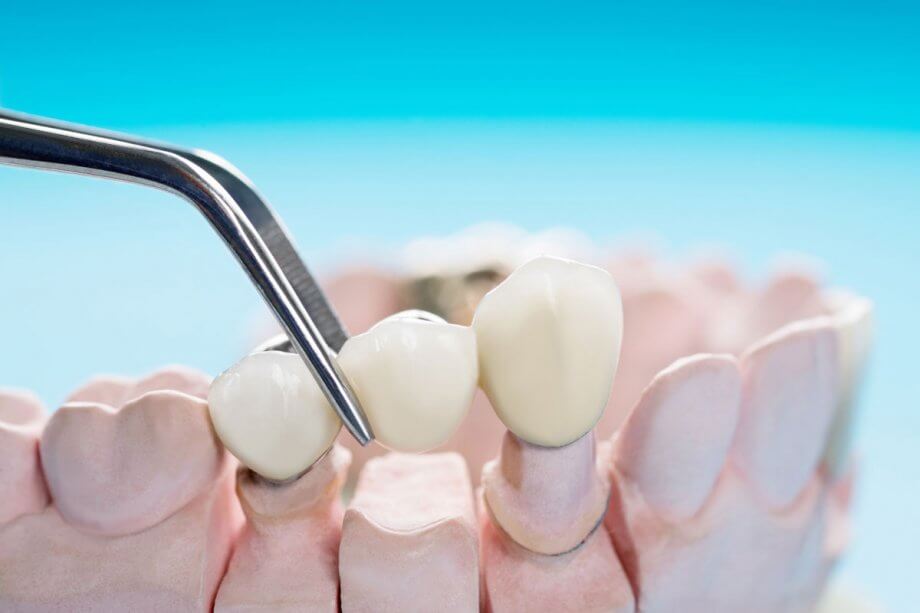Do you need to have a tooth replaced? Sometimes a tooth simply can’t be saved. Even so, it is in your best interest to replace the tooth rather than leaving an empty space in your mouth. What are your options for replacing one or a few teeth? Dental implants and dental bridges can both replace missing teeth, but they are very different.
Which option would be best for you? Consider the pros and cons of each option to help you decide.
What Is a Dental Implant?
A dental implant is an artificial tooth and root system. The root portion is made of titanium and it resembles a screw with threads. The implant is surgically placed in the jaw bone where it fuses with the bone in a process called osseointegration. This process takes a few months, but once the bond is solidified, an abutment and crown can be attached to the implant.
Advantages of Dental Implants:
- Natural appearance. Dental implants look very natural because they mimic a natural tooth.
- Natural function. Because a dental implant is surgically placed in the jaw, it provides the same function and bite strength of a natural tooth.
- Can last for a lifetime. Dental implants can last for at least 30 years or the rest of your life.
- Preserves the bone in the jaw. The presence of the implant prevents the bone in the jaw from deteriorating.
Disadvantages of Dental Implants:
- The cost is higher than a bridge. A dental implant is considered to be the best option for tooth replacement, and with that comes a higher cost.
- The placement process takes longer. Because a dental implant requires minor oral surgery, the procedure itself takes longer, as well as the period of time after the placement while the implant is fusing with the bone.
What is a Dental Bridge?
A dental bridge is an artificial tooth that is supported by the healthy teeth on either side of the missing tooth. The artificial tooth is suspended between two crowns that fit over the neighboring teeth. It is made of porcelain and sits atop the gums.
Advantages of a Dental Bridge:
- The cost is lower than a dental implant. A bridge costs less than a dental implant, which makes them seem more appealing to both patients and insurance providers.
- It can be used when the existing jaw bone can’t support an implant. If you lack sufficient bone density in the jaw to support an implant, a bridge can be used instead.
- It can be placed in a much shorter period of time than a dental implant. A bridge can be fitted and placed all within a few weeks.
- A bridge is less invasive than a dental implant. A bridge does not require dental surgery to place.
Disadvantages of a Dental Bridge:
- A bridge can cause damage to the healthy teeth. Because a bridge uses the healthy teeth on either side of the missing tooth as an anchor, it can eventually cause damage to those teeth.
- Healthy tooth material is lost during the placement. To be fitted with crowns, the healthy teeth must be shaved down, and that lost enamel cannot regenerate.
- A bridge does nothing to preserve bone health in the jaw. A bridge sits above the gums without extending into the jaw, which means it doesn’t preserve healthy bone structure.
Dental Implant Supported Bridges
If you need to replace multiple teeth in a row, a combination of dental implants and a bridge can be a worthwhile option. Dental implants can be placed to act as anchors for a bridge. The implants provide solid support and the bridge makes the entire process more affordable.
Which Option is Best For You? Ask Holzinger Periodontics
If you’re not sure which option would be best for your tooth replacement needs, ask the experts at Holzinger Periodontics and Dental Implants. We can evaluate your oral health and provide our best recommendation for treatment. We also take your preferences into consideration, listening to your needs and wants for your tooth replacement.
Call 860-347-8457 today to schedule a consultation at our Middletown office, 860-224-0433 for our New Britain office, or request an appointment. We look forward to providing you with the best tooth replacement option for you.

